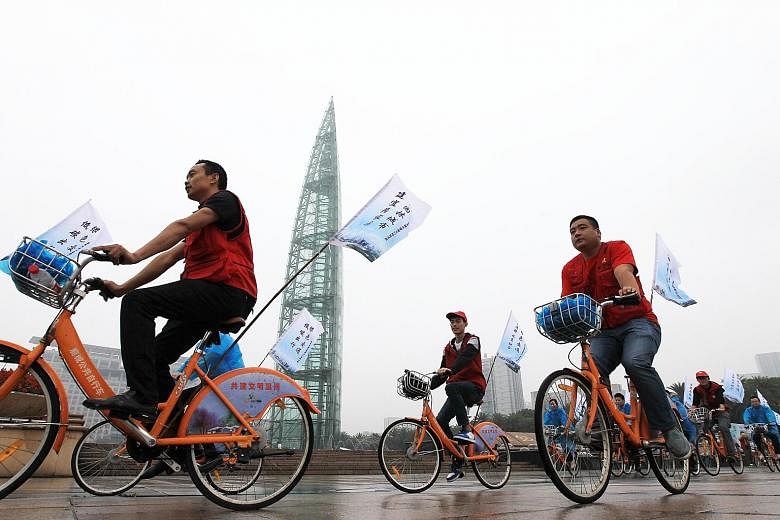China marked World Car-Free Day for the ninth year in a row yesterday, an event often greeted in the country with scepticism as millions of vehicles continue to clog its biggest cities.
That scepticism is well-founded. Beijing's traffic index - which measures road congestion on a scale of zero to 10 - hit 9.1 in parts of the capital yesterday morning, although it was among the 171 Chinese cities participating.
But a tipping point could be arriving as Chinese drivers put the brakes on the world's largest car market by volume, experts told The Straits Times.
Mirroring China's lower gross domestic product growth, new-car sales now will slow for the long term, analysts say, as commuters increasingly seek alternative transport and cars lose their shine as status symbols among urbanites.
China's new-car sales fell for a third consecutive month last month after almost constant double-digit growth during the past decade.
The China Association of Automobile Manufacturers had in July slashed its 2015 forecast for vehicle sales growth from 7 to 3 per cent, but its deputy secretary-general recently admitted that the final figure may even dip below zero.
Ratings agency Fitch said in a report last week that China's passenger vehicle market is entering a new phase, with annual sales volume growth slowing to mid-single digits over the next decade.
Analysts say the slowing economy is a key reason for the current drag on vehicle sales, along with the country's crackdown on corruption and widening restrictions on ownership targeted at curbing pollution.
The economic factors at play can be seen in how the main decline came from commercial vehicles, noted Shanghai-based automobile expert Wang Hua from Kedge Business School.
But the stock market rout has also sapped spending power from consumers, especially young first-time buyers.
"These people have been driving growth in China's automobile sector but now have their money stuck in share losses," said Mr Jia Xinguang, an adviser with the China Automobile Dealers Association.
Weaker economic sentiment aside, people in China's mega-cities are also rethinking the value of car ownership, noted Mr Pierre-Henri Boutot from consultancy firm Bain, who co-authored a report on the issue this year.
Worsening traffic conditions and tighter regulations have made car ownership less attractive, according to his study, which surveyed 2,100 car owners from Beijing, Shanghai, Tianjin, Wuhan, Shenzhen and Chengdu.
"Cars are still desirable in China, but they're not the status symbol they were 10 years ago. The bar is much higher now," said Mr Boutot. "In major cities, the bigger concern is about mobility. This raises questions about traditional models of ownership and will be something to watch in the long term."
Analysts, however, believe there is still room for growth in China's car sector when its economic outlook improves, particularly in the central and western parts of the country, where car ownership is relatively low.
In Tier-3 and Tier-4 cities, the competition will be over mass-market models, while top-tier cities focus on the faster-growing segments of sports utility vehicles and multi-purpose vehicles.
Even currently congested Chinese cities have the capacity for more vehicles if the government can improve infrastructure and traffic management to reduce unnecessary jams.
"China's car density isn't very high. But its traffic jams are far worse than in other countries because of poor transport management," said Dr Wang.
"As long as China's economy continues to grow, 5 to 6 per cent growth in car sales in the future shouldn't be a problem," he added.

